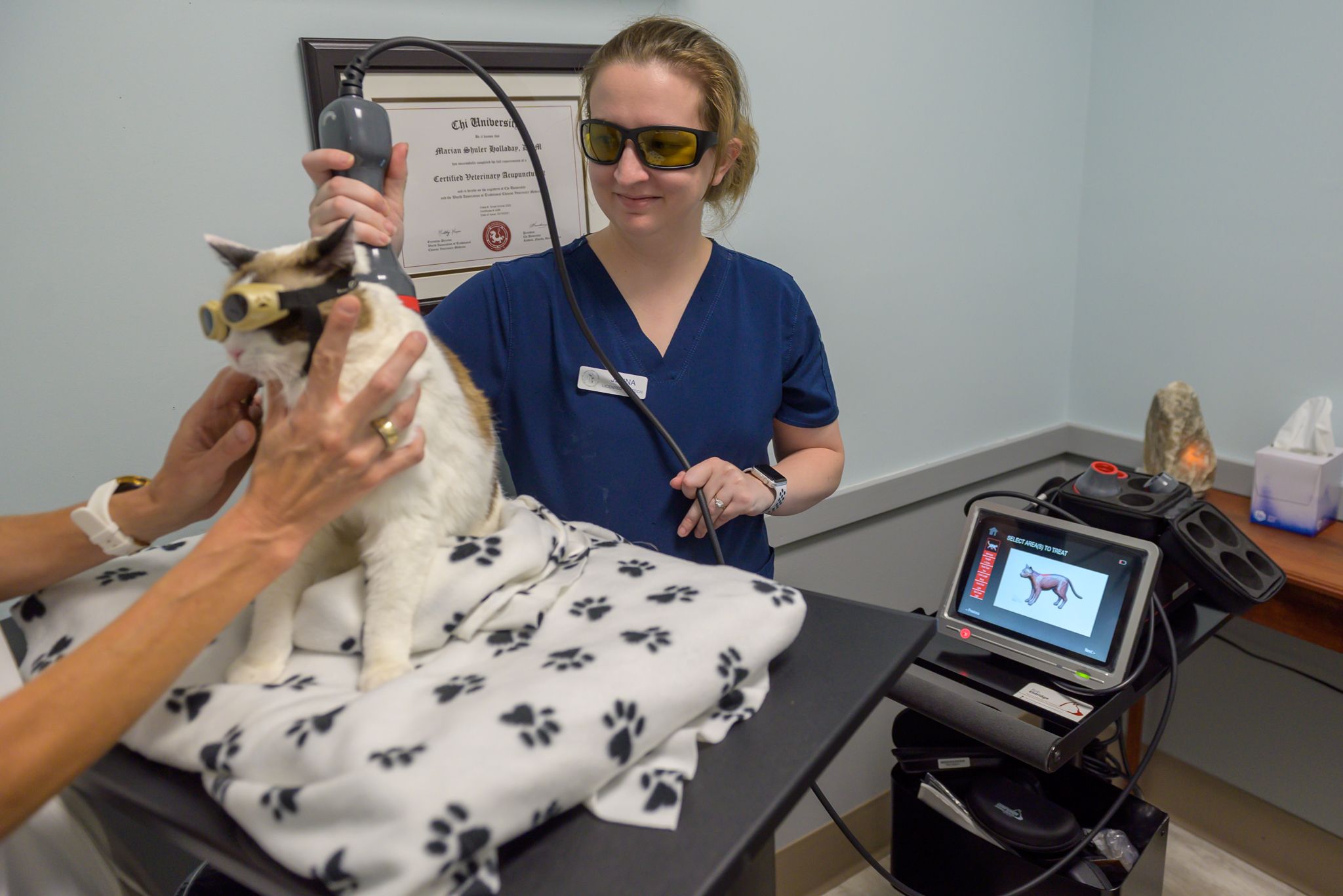The laser is a frequently used veterinary medicine tool, and many types are available for various purposes. Veterinarians use cold lasers to promote pets’ healing after surgery or injury, or to ease chronic painful conditions. Our Mount Pleasant Animal Hospital team is proud to offer our patients multiwave locked system (MLS) laser therapy—the most advanced cold laser currently available. Cold lasers produce photobiomodulation—the process through which the laser penetrates the body’s tissues to alter them on a cellular level, resulting in a beneficial effect.
What is photobiomodulation?
The term photobiomodulation is the process through which cold lasers affect cells and tissues. A laser uses specific light wavelengths that penetrate tissues up to several centimeters, and modulate cell behaviors in ways that improve healing and reduce inflammation. Laser’s effects on cells and tissues include:
- Increased energy production
- Quicker cell turnover
- Increased lymphatic drainage
- Increased blood flow
- Nerve cell regeneration
- Increased collagen production
- Immune cell modulation
Traditional laser units can use only one light wavelength, limiting treatment to one targeted goal, such as relieving pain or decreasing inflammation. The MLS laser uses pulsing synchronized light wavelengths that deliver two proven wavelengths together, providing superior, synergistic benefits more quickly than a traditional laser unit.
How do pets benefit from photobiomodulation?
When laser light stimulates damaged cells and tissues through photobiomodulation, the end result is quicker, more efficient healing. Other photobiomodulation benefits include:
- Decreased inflammation
- Decreased swelling
- Decreased scarring
- Decreased pain
- Quicker return to activity
Which pet conditions respond best to photobiomodulation?
Any condition that causes a pet pain or inflammation can benefit from laser therapy, so the possibilities are truly endless. Laser is most commonly used to treat the following conditions:
- Surgical or traumatic wounds
- Tooth extraction sites
- Chronic osteoarthritis
- Lick granuloma
- Skin and ear infections
- Muscle, tendon, and ligament injuries
Does photobiomodulation have side effects or risks?
Overall, cold laser therapy risks are low, but some risks do exist. Photobiomodulation can potentially accelerate tumor growth, so patients with cancer or who are suspected of having cancer should not be treated with laser therapy. Lasers can also damage the retina, so everyone in the room during laser therapy—including the pet—must wear proper eye protection. Although cold lasers do not typically generate enough heat to cause injury, only trained personnel should perform the treatment to prevent potential tissue damage as a result of delivering more energy than required for a specific area or for a pet’s specific condition. Extremely low-level light therapies, such as those sold for home use, do not pose this risk, but these units are likely to be less effective.
Can photobiomodulation in pets be combined with other therapies?
Laser therapy can be a standalone treatment for pets who cannot take medications or tolerate other therapies. However, laser therapy is most effective as part of a multimodal treatment strategy. Our Mount Pleasant Animal Hospital team commonly provides laser therapy with these complementary treatment modalities:
- Chiropractic
- Acupuncture
- Supplements
- Specialized nutrition
- Rehabilitation exercises and therapies
- Anti-inflammatory and pain medications
How is photobiomodulation therapy delivered to pets?
Laser therapy is painless for pets, and can be delivered in the exam room with the owner present if they wish, or in the treatment area for hospitalized pets. Everyone present must wear special goggles to protect their eyes while a trained veterinary technician or veterinarian delivers a precise light energy dose according to the pet’s specific condition and therapy plan. For the best outcome, multiple treatments are provided, usually throughout several weeks or months. Costs are often bundled, so that you pay one package price for all included sessions. If your veterinarian recommends complementary therapies to control your pet’s conditions, they may also be included in the package price. Laser can speed a pet’s injury recovery, or the therapy may be prescribed as an ongoing maintenance treatment for pets who have chronic conditions, such as arthritis or skin disease.
With few side effects and low risks, photobiomodulation offers a safe, effective option for treating pets’ pain and inflammation. Contact us to discuss whether your pet could benefit from MLS laser treatment and other rehabilitation treatments we offer, or to schedule your furry pal’s visit with our Mount Pleasant Animal Hospital team.
To learn more about our family-owned Mount Pleasant-area veterinary hospitals, which have served the community for more than 70 years, visit Animal Hospitals of the Lowcountry, Shuler Veterinary Clinic, or Safe Harbor Animal Hospital.








